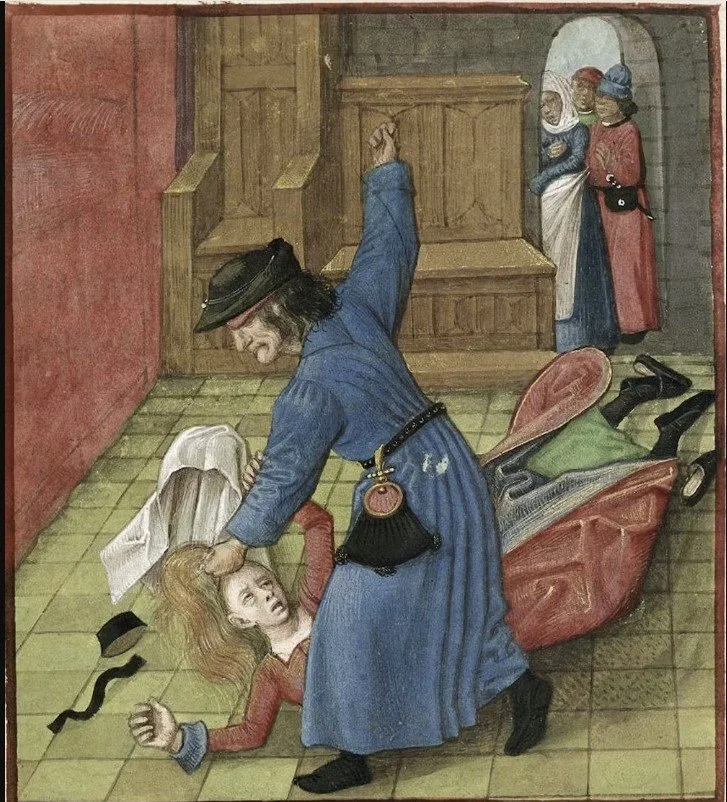Fulk V of Anjou: the King Who Beat His Queen
Candidate Number Two in the Medieval Misogyny Series
Fulk V of Anjou
In 1129, the Christian kingdom of Jerusalem was at a crossroads. King Baldwin II, old and childless of sons, had named his eldest daughter Melisende as his heir. It was an extraordinary decision: a woman would inherit one of Christendom’s most precarious kingdoms. But Baldwin was no fool. He knew that without a strong marriage alliance, his daughter would face endless challenges.
The match chosen was Fulk V of Anjou: widowed, wealthy, and experienced in warfare (and, incidentally, father of Geoffrey of Anjou). He had ruled Anjou for two decades, fathered grown sons, and had already been on pilgrimage to the Holy Land. In theory, he was the perfect partner for Melisende.
In practice, their marriage revealed the fragility of female authority in a world unwilling to accept it.
Fulk’s Determination to Dominate
When Fulk arrived in Jerusalem, he wasted no time in asserting himself. Rather than rule alongside Melisende as Baldwin had intended, he began sidelining her in every act of government. Charters that once bore her name alone now appeared only with Fulk’s. The Angevin knights who followed him filled the court, and Melisende’s supporters were dismissed.
Chroniclers tell us that Fulk acted as if Jerusalem were his by right, ignoring the fact that he was only there through his wife’s inheritance. To medieval men, this seemed natural. To Melisende’s followers, it was an outrage.
Domestic Violence Exposed
Medieval Domestic Violence
But Fulk’s worst crime was not political — it was personal. According to William of Tyre, the great chronicler of the Crusader states, Fulk even struck Melisende when she resisted his efforts to shut her out of power.
This was not whispered gossip. It was an open scandal in Jerusalem, shocking the nobility who had sworn to support their queen. The spectacle of a king beating his queen undermined not only Melisende’s dignity but the authority of the monarchy itself.
The Barons Strike Back
Melisende’s allies among the nobility rose in protest. The barons of Jerusalem were loyal to her family, and many had known her since childhood. They confronted Fulk, warning him that he would not be allowed to mistreat their queen.
Faced with unified resistance, Fulk was forced to back down. From then on, charters once again bore Melisende’s name. She was restored as co-sovereign, her authority secured not only by blood but by the loyalty she commanded.
It was one of the rare moments in medieval history where a queen successfully resisted her husband’s attempts to usurp her.
Melisende’s Triumph
Queen Melisende of Jerusalem
The years that followed showed Melisende’s resilience. After Fulk’s death in a hunting accident in 1143 (some said it was divine retribution) Melisende ruled in her own right as regent for her son, Baldwin III. Her reign was remembered as stable and wise, in contrast to the turbulence that followed her death.
Fulk, by contrast, left little but infamy in this regard. Chroniclers remembered him as a capable soldier but a poor king, especially in his treatment of his queen.
Why He’s a Villain
He tried to usurp a legitimate queen regnant’s authority.
He physically assaulted his wife when she resisted.
He attempted to erase a woman’s rightful inheritance.
Did You Know?
Fulk’s son, Geoffrey Plantagenet, married Empress Matilda, daughter of King Henry I. Their union was stormy, with quarrels and long separations, but unlike his father, Geoffrey was never accused of domestic violence. Chroniclers criticised their personalities, not physical cruelty. But of course, we’ll never know. Geoffrey didn’t exactly have a great role model!
Melisende’s Legacy
Melisende endured domestic abuse, political sidelining, and the constant threat of being erased from history. Yet she emerged triumphant, ruling Jerusalem in her own name and becoming one of the most respected queens of the Middle Ages. Her story reminds us that medieval women, even in the most hostile circumstances, could fight back and win.
Closing Thought
Fulk’s actions reveal the violence and arrogance that often lurked beneath medieval kingship. His willingness to strike his queen was shocking even to contemporaries, proof that misogyny could undermine not just marriages but entire kingdoms.
Was Fulk of Anjou the worst husband of the 12th century — or does Matthew of Boulogne still hold the crown?
Next Up: Philippe II of France, the king who humiliated his bride on their wedding day.


